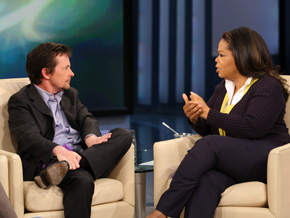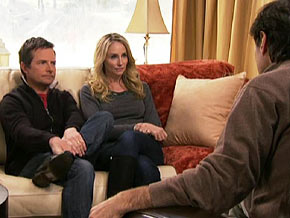Michael J. Fox's Personal Battle

For more than 25 years, Michael J. Fox has been making America laugh. This Canadian-born actor made a name for himself in the early '80s as Alex P. Keaton, a conservative teen with hippie parents, on the hit show Family Ties . Then, he blasted into theaters as the star of blockbuster movies like Back to the Future .
In 1991, at the height of his career, Michael's life took an unexpected turn. He was diagnosed with Parkinson's disease, a chronic neurological disorder that can cause debilitating tremors.
At first, Michael kept his diagnosis private. He went on to produce and star in the comedic series Spin City . Then, as his symptoms worsened and became harder to disguise, Michael went public with his battle.
In 1991, at the height of his career, Michael's life took an unexpected turn. He was diagnosed with Parkinson's disease, a chronic neurological disorder that can cause debilitating tremors.
At first, Michael kept his diagnosis private. He went on to produce and star in the comedic series Spin City . Then, as his symptoms worsened and became harder to disguise, Michael went public with his battle.

In 1998, Michael spoke out about his disease and the need for increased Parkinson's research. Since then, this father of four has become the voice for millions of chronically ill Americans and a vocal proponent of stem cell research.
Dr. Oz says people suffering from this disease can sometimes manage their uncontrollable tremors with medication…but not always.
"How much medication did you have to take in preparation for today?" Oprah asks.
"A boatload," Michael says.
Dr. Oz says people suffering from this disease can sometimes manage their uncontrollable tremors with medication…but not always.
"How much medication did you have to take in preparation for today?" Oprah asks.
"A boatload," Michael says.

Parkinson's is a degenerative disease, and Michael says his symptoms change year after year.
"I think the biggest frustration is when I want to sit down for a second, and I can't sit down…like my legs won't stop moving," he says.
To illustrate his point, Michael says Parkinson's is like having a 4-year-old child climbing around on your lap all the time, pulling on your arms and legs. "You're just trying to be patient and focus on what you need to do," he says.
Michael says simple tasks like brushing his teeth and getting out of bed have become more challenging.
Listen to Michael describe his morning routine.
"I think the biggest frustration is when I want to sit down for a second, and I can't sit down…like my legs won't stop moving," he says.
To illustrate his point, Michael says Parkinson's is like having a 4-year-old child climbing around on your lap all the time, pulling on your arms and legs. "You're just trying to be patient and focus on what you need to do," he says.
Michael says simple tasks like brushing his teeth and getting out of bed have become more challenging.
Listen to Michael describe his morning routine.

A few weeks before Michael's trip to Chicago, Dr. Oz got a rare look inside his private life.
Dr. Oz says he first met Michael in 1990 when he was chief resident at NewYork–Presbyterian Hospital. In preparation for a starring role in Doc Hollywood , Michael shadowed Dr. Oz as he made rounds and treated patients.
They met again in New York, and sat down with Michael's wife of 20 years, actress Tracy Pollan. Dr. Oz says Michael's latest book Always Looking Up reveals details of their Hollywood love story and describes Tracy as Michael's "rock."
"I think what she is is much more special than being a rock," Michael says. "Rocks are rigid and nonyielding, and she's very fluid."
Dr. Oz says he first met Michael in 1990 when he was chief resident at NewYork–Presbyterian Hospital. In preparation for a starring role in Doc Hollywood , Michael shadowed Dr. Oz as he made rounds and treated patients.
They met again in New York, and sat down with Michael's wife of 20 years, actress Tracy Pollan. Dr. Oz says Michael's latest book Always Looking Up reveals details of their Hollywood love story and describes Tracy as Michael's "rock."
"I think what she is is much more special than being a rock," Michael says. "Rocks are rigid and nonyielding, and she's very fluid."

Since her husband was diagnosed with Parkinson's 18 years ago, Tracy says their marriage has changed…in a good way. "When we were first married, he was so busy working all the time," she says. "So, in some ways, it's made him a lot more available."
Even when he's symptomatic, Michael says his wife sees past the shaking and physical challenges. "She sees who I am, and she likes me as much as she ever liked me," he says. "We have a sense of humor about life, and we enjoy life. We feel every day that we're so blessed."
Even when he's symptomatic, Michael says his wife sees past the shaking and physical challenges. "She sees who I am, and she likes me as much as she ever liked me," he says. "We have a sense of humor about life, and we enjoy life. We feel every day that we're so blessed."

When Michael was diagnosed with Parkinson's in 1991, he and Tracy only had one child, a son named Sam. Since then, they've added three little girls to their family.
How does a dad explain Parkinson's to small children? Michael says he simplifies the disease by explaining that his brain works differently than other brains.
"I won't talk in terms of something wrong or something broken or some illness or sickness," he says. "I'll just say, 'My brain doesn't get the messages the way your brain sends the messages to your body.'"
How does a dad explain Parkinson's to small children? Michael says he simplifies the disease by explaining that his brain works differently than other brains.
"I won't talk in terms of something wrong or something broken or some illness or sickness," he says. "I'll just say, 'My brain doesn't get the messages the way your brain sends the messages to your body.'"

Tracy says having Michael as a father has helped their children be more empathetic. "They just have a natural understanding of what's comfortable for Michael and what's not," she says. "They're not scared about it, but they just understand."
At times, Tracy says the children describe Michael as "shaky Dad." "They would never say 'Parkinson's' or they wouldn't say 'sick,'" she says. "['Shaky' is] sort of more of a visual description to them."
"I am shaky Dad," Michael says.
Michael says living with a chronic disease has helped him realize that every little moment is special. "If I'm sitting watching TV or something, and my kids come and want to show me something or want to ask me something, I just made up my mind that there's nothing that I'm doing at any time that's more important than that," he says. "I don't know that I would think that way before this happened. … So as long as I can get there, I'll be there."
At times, Tracy says the children describe Michael as "shaky Dad." "They would never say 'Parkinson's' or they wouldn't say 'sick,'" she says. "['Shaky' is] sort of more of a visual description to them."
"I am shaky Dad," Michael says.
Michael says living with a chronic disease has helped him realize that every little moment is special. "If I'm sitting watching TV or something, and my kids come and want to show me something or want to ask me something, I just made up my mind that there's nothing that I'm doing at any time that's more important than that," he says. "I don't know that I would think that way before this happened. … So as long as I can get there, I'll be there."

Since Michael's symptoms are ever-changing, Dr. Oz says he can go from shaky to steady in just a few hours.
When the tremors subside, Michael likes to lace up his skates and enjoy a favorite childhood pastime—ice hockey.
After his sit-down interview, Michael asks Dr. Oz to meet him at Wollman Rink in New York City's Central Park.
"I was a little worried he might need a little help on the ice," Dr. Oz says. "Boy, was I wrong."
Watch as Michael glides across the ice.
When the tremors subside, Michael likes to lace up his skates and enjoy a favorite childhood pastime—ice hockey.
After his sit-down interview, Michael asks Dr. Oz to meet him at Wollman Rink in New York City's Central Park.
"I was a little worried he might need a little help on the ice," Dr. Oz says. "Boy, was I wrong."
Watch as Michael glides across the ice.

Seeing Michael skate was like listening to a stutterer who can sing, Dr. Oz says. "It's amazing." Dr. Oz explains that fluid motions, like skating, come more easily to people with Parkinson's than walking, which requires gears in the brain to stop and start constantly.
Other times, diminished symptoms aren't as easily explained. While filming a documentary about optimism for ABC—Michael J. Fox: Adventures of an Incurable Optimist—Michael traveled to Bhutan, a kingdom in the Himalayas that measures the gross national happiness of its citizens.
"I don't know whether it was the altitude or the thinning of the blood or whatever, but I had much less symptoms," he says. "It was just an amazing place, and it really was special."
Other times, diminished symptoms aren't as easily explained. While filming a documentary about optimism for ABC—Michael J. Fox: Adventures of an Incurable Optimist—Michael traveled to Bhutan, a kingdom in the Himalayas that measures the gross national happiness of its citizens.
"I don't know whether it was the altitude or the thinning of the blood or whatever, but I had much less symptoms," he says. "It was just an amazing place, and it really was special."

In March 2009, Michael found himself back in the headlines after President Barack Obama lifted the eight-year ban on federally funded stem cell research.
For years, this has been a major initiative for his organization, the Michael J. Fox Foundation for Parkinson's Research .
Embryonic stem cell research is a controversial topic in American politics. Opponents and anti-abortion activists believe using human embryos in the name of science is immoral. Supporters of the research believe the findings could help treat millions of men and women living with ailments like Parkinson's, cancer and heart disease.
Michael believes President Obama's decision is a step in the right direction. "It was absolutely crucial that this research be unfettered and allowed today to go forward in a responsible way," he says. "People's concerns, I understand, and I just have faith in our scientists and the research community that they'll do this ethically and to good purpose."
For years, this has been a major initiative for his organization, the Michael J. Fox Foundation for Parkinson's Research .
Embryonic stem cell research is a controversial topic in American politics. Opponents and anti-abortion activists believe using human embryos in the name of science is immoral. Supporters of the research believe the findings could help treat millions of men and women living with ailments like Parkinson's, cancer and heart disease.
Michael believes President Obama's decision is a step in the right direction. "It was absolutely crucial that this research be unfettered and allowed today to go forward in a responsible way," he says. "People's concerns, I understand, and I just have faith in our scientists and the research community that they'll do this ethically and to good purpose."

Michael says America has a lot of ground to make up when it comes to stem cell research. "We had eight years where there was no forward progress and some things people don't even understand," he says.
"For example, if you say no federal funding for stem cell research, that means if there's a university or hospital that receives any funding for anything, they can't do even privately funded stem cell research," he says. "The kind of iterations of impact were really severe."
Watch as Dr. Oz explains the medical benefits of stem cells.
Thanks to recent scientific discoveries, Dr. Oz says stem cells aren't the only solution. "We went to a place we never thought we would go," he says. "I can take a little bit of your skin, take those cells and get them to go back in time so they're like they were when you were first made."
Dr. Oz says these skin cells, which contain your genes and are less prone to cancer, will be the ones that are ultimately used to cure Parkinson's. "I think we're single digit years away from making a big impact in the lives of [people with] Parkinson's disease, but also diabetics and heart attack victims," he says.
"For example, if you say no federal funding for stem cell research, that means if there's a university or hospital that receives any funding for anything, they can't do even privately funded stem cell research," he says. "The kind of iterations of impact were really severe."
Watch as Dr. Oz explains the medical benefits of stem cells.
Thanks to recent scientific discoveries, Dr. Oz says stem cells aren't the only solution. "We went to a place we never thought we would go," he says. "I can take a little bit of your skin, take those cells and get them to go back in time so they're like they were when you were first made."
Dr. Oz says these skin cells, which contain your genes and are less prone to cancer, will be the ones that are ultimately used to cure Parkinson's. "I think we're single digit years away from making a big impact in the lives of [people with] Parkinson's disease, but also diabetics and heart attack victims," he says.

Though Michael has learned to accept his disease and embrace his life, he says there are still days when he thinks, "This sucks."
"Having said that, somebody said to me one time that happiness grows in direct proportion to your acceptance and in inverse proportion to your expectations," he says. "So if you can just kind of say: 'Well, this is what I have today. Now, I didn't have a choice about this, but I have a million other choices I can make today. I can choose where I go. I can choose how I feel about where I go.' … If I make those choices well, I'm going to be a happy person."
When he first made it big, Michael says he was Michael, the actor. Then, he became Michael, the actor with Parkinson's. When he left Hollywood, he says he wondered if he would just be Michael with Parkinson's…but he's become so much more.
"I'm a dad, I'm a husband, I'm an activist, I'm a writer and I'm just a student of the world," he says. "This is one fact of my life, but it's not the totality of my life. It doesn't define me."
"Having said that, somebody said to me one time that happiness grows in direct proportion to your acceptance and in inverse proportion to your expectations," he says. "So if you can just kind of say: 'Well, this is what I have today. Now, I didn't have a choice about this, but I have a million other choices I can make today. I can choose where I go. I can choose how I feel about where I go.' … If I make those choices well, I'm going to be a happy person."
When he first made it big, Michael says he was Michael, the actor. Then, he became Michael, the actor with Parkinson's. When he left Hollywood, he says he wondered if he would just be Michael with Parkinson's…but he's become so much more.
"I'm a dad, I'm a husband, I'm an activist, I'm a writer and I'm just a student of the world," he says. "This is one fact of my life, but it's not the totality of my life. It doesn't define me."

When people come face-to-face with someone who's living with a debilitating disease, Dr. Oz says they sometimes can't see past the illness.
After spending time with Michael, Dr. Oz sees an opportunity to change that perception. "[People] don't even see you shaking anymore once they're close to you. They look into your eyes, and they see your soul, and that's what's interesting to them," he says. "All this stuff sort of dissolves away into your peripheral vision, and all of a sudden, there's just Michael there. That's what's beautiful about it."
In Always Looking Up , Michael writes that for everything this disease has taken, something with greater value has been given. "If I hadn't faced this, I don't know that I'd have the family that I have now," he says. "I don't know that I'd be doing the things that I'd be doing now. I don't know that I'd be writing. I don't know that I'd be traveling."
Meet a young woman living with dystonia
After spending time with Michael, Dr. Oz sees an opportunity to change that perception. "[People] don't even see you shaking anymore once they're close to you. They look into your eyes, and they see your soul, and that's what's interesting to them," he says. "All this stuff sort of dissolves away into your peripheral vision, and all of a sudden, there's just Michael there. That's what's beautiful about it."
In Always Looking Up , Michael writes that for everything this disease has taken, something with greater value has been given. "If I hadn't faced this, I don't know that I'd have the family that I have now," he says. "I don't know that I'd be doing the things that I'd be doing now. I don't know that I'd be writing. I don't know that I'd be traveling."
Meet a young woman living with dystonia
Keep Reading
Always Looking Up
How do you brush your teeth when you can't control your hands? Michael describes his morning routine in his latest book.
How do you brush your teeth when you can't control your hands? Michael describes his morning routine in his latest book.
Living with Dystonia
It's a rare disorder that can strike at any time. How an active, 37-year-old woman's life changed dramatically in less than a year.
It's a rare disorder that can strike at any time. How an active, 37-year-old woman's life changed dramatically in less than a year.
More on this Topic
As a reminder, always consult your doctor for medical advice and treatment before starting any program.









